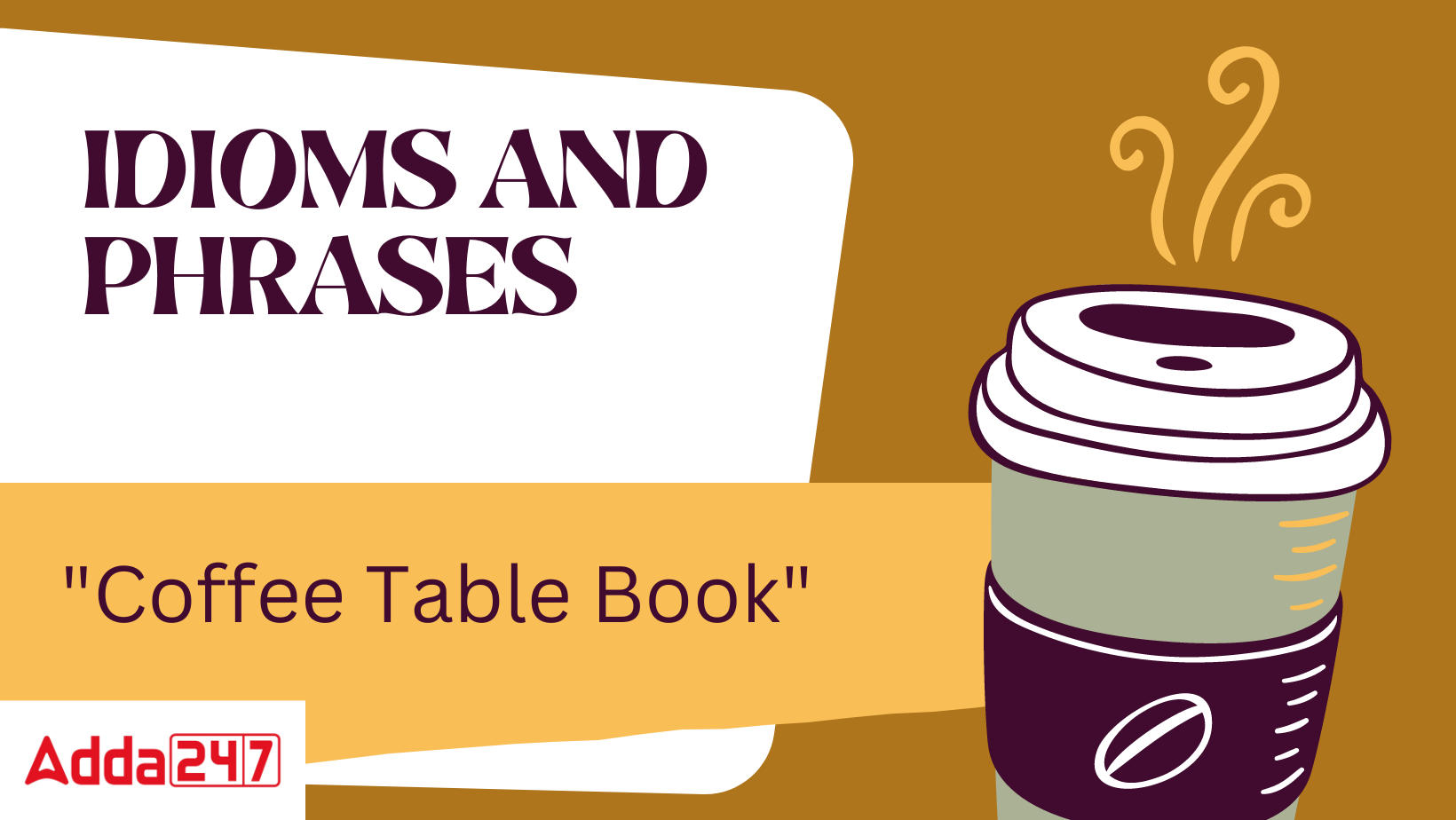The English language has idioms and phrases, which are frequently employed to add interest to sentences. Idioms are frequently employed in poetry, storytelling, and spoken language. Although their exact roots are not always known, many idioms are said to have developed through time from storytelling and other forms of creative writing. In contrast to idioms, phrases are straightforward and to the point. The phrase means what the words imply; it has no figurative undertones. In Board exams and Many competitive exams like CUET, CLAT, NDA, and other competitive exams involving English language themes, usually include idioms and phrases questions.
Idioms Meaning
Idioms are a group of expressions that have a common, established, and understood metaphorical meaning. Therefore, it is impossible to interpret these sentences literally because doing so would make them absurd. Idioms may also look grammatically out of the ordinary.
Idioms are a helpful language tool. They give the prose life and colour. Instead of writing simple, dull paragraphs, it enables the authors to play with words and make the text exciting to read. Idioms are frequently employed in poetry, storytelling, and spoken language. Although their exact roots are not always known, many idioms are said to have developed through time from storytelling and other forms of creative writing.
Let’s look at some incredibly inventive idioms and their corresponding meanings.
10 Idioms with Meanings and Examples
As you watch American TV shows or films, you must have seen commonly used English idioms. English idioms, proverbs, and phrases are widely used in written and spoken common English. Idioms don’t always make sense literally, therefore students need to understand what they mean and how to utilise them. Even though it might seem like a lot of work, idioms are enjoyable! It is frequently referred to as a speaking style that sounds more native, thus learning some of these terms is really helpful.
So, the top 10 idioms together with their definitions and use examples are listed below:
| IDIOM | MEANING | EXAMPLE |
| In for a penny, in for a pound | That someone is intentionally investing his time or money for a particular project or task. | When Athlead was booming, Jim was in for a penny and in for a pound, that’s how much dedicated he was. |
| A bird in the hand is better than two in the bush | An opportunity in hand, currently, is better than a prospect in the future, because time never repeats itself. | The detective apprehended 3 criminals and saw other one running but didn’t chase him, because she knew a bird in one hand is better than two in the bush. |
| Chip off the old block | That a person is similar in behaviour or actions like his parents. | When grandmother saw her grandson collecting coins like her son used to do, she knew he was a Chip off the old block. |
| Do unto others as you would have them do unto you | Treat people the same way you want to be treated. | I felt Peter was a little cold today towards that homeless man, he should do unto others as he would have them do unto him, because who knows about time. |
| Don’t cry over spilt milk | Don’t cry over what has happened as it can not be fixed. | Walter failed his examination but his dad came and said just one thing, “Son, Don’t cry over spilt milk.” |
| Beside yourself with joy | To be extremely happy. | I can see that you are beside yourself with joy on being selected for the job, congratulations. |
| A black sheep | Being a disgrace for the family. | They don’t talk about Olive anymore, turns out he was the Black sheep for the family, he married someone else while he was still arranged to his fiancé. |
| Down for the count | Tired; giving up. | My pet dog is down for the count after playing the whole day with the frisbee. |
| Break a leg | Saying good luck to someone. | Hey Barry, it’s time for you to get on the stage and present your monologue, break a leg. |
| Go the extra mile | To make an extra effort. | He was willing to go the extra mile for the love of his life, Mia. |
Online Live Classes for CBSE BOARD CLASS 12TH
20 Idioms with Meanings
Some idioms with their meanings are given below in the form of a tables
| Idiom | Idioms Meaning |
| Beat around the bush | To avoid talking about what’s important |
| Get your act together | Get organized and do things effectively |
| Hit the sack | Go to sleep |
| Your guess is as good as mine | I do not know |
| Good things come to those who wait | To have patience |
| Back against the wall | Stuck in a difficult circumstance with no escape |
| Up in arms | Being grumpy or angry about something |
| Scrape the barrel | Making the most of the worst situations or things because you can’t do anything about it |
| Burn your boats/bridges | Doing something that makes it impossible to go back to the original state. |
| Break fresh/ new ground | Doing something that has never been done before |
| Sell like hot cakes | Quick sellout |
| Run around in circles | Putting efforts into something that is not a worthwhile result |
| On cloud nine | Being very happy |
| Left out in the cold | Being ignored |
| Blow hot and cold | Alternate inconsistently between moods and actions |
| Cut corners | Doing something in an easier and least expensive manner |
| Boil the ocean | Taking up an almost impossible or overly ambitious project |
| Keep an ear to the ground | Staying informed and updated about everything |
| Eat like a horse | Eating too excessively |
| A snowball effect | The aspect of momentum in every event and how they build upon each other |
Idioms and Phrases in English Examples with Meaning
| Idioms/Phrases | Meaning |
| The ball is in your court | one needs to take some action to keep something going |
| A piece of cake | something easily achieved |
| A picture paints a thousand words | an image of a subject conveys its meaning or essence more effectively than a description does. |
| Tie the knot | to marry a mate |
| Bed of roses | an easy, comfortable situation. |
| To make a long story short | used to end an account of events quickly |
| Sixth sense | a supposed power to know or feel things that are not perceptible by the five senses of sight, hearing, smell, taste, and touch. |
| Rome was not built in a day | Important work takes time |
| Turn a blind eye | pretend not to notice. |
| Don’t put all your eggs in one basket | a piece of advice which means that one should not concentrate all efforts and resources in one area. |
| Through thick and thin | under all circumstances, no matter how difficult |
| Rise and shine | Wake up and get out of bed promptly |
| Wet one’s whistle | have a drink |
| Put the best foot forward | Start impressively |
| Stick one’s neck out | To take a risk |
| Bear the palm | Be victorious |
| From the horse’s mouth | From a reliable source |
| Fool’s errand | Useless undertaking |
| Be hand and foot | In all possible ways; by all means |
| Gray matter | Intelligence |
| Hear it on grapevine | To hear rumours about something or someone |
| Bend over backwards | Do whatever it takes to help, willing to do anything |
| Get your walking papers | Get fired from the job |
| For the time being | Temporarily |
| Lock and key | In safe place |
| Cast a shadow on | Spoil or let down |
| In the face of | Regardless |
| Whole bag of tricks | Make use of all the possibilities or techniques to achieve something. |
| Dog eat dog | Ruthlessly competitive |
| Vote with one’s feet | To show disapproval |
| Wipe the nose of | To Cheat |
| Cork something up | To stop up one’s mouth and be quiet |
| Cook someone’s goose | Spoil other person’s chances of success |
| Sink or swim | Fail or succeed |
| Hit the road running | Start something and proceed at a fast pace with enthusiasm |
| To toe the line | To accept the authority or policies of a particular group, especially unwillingly |
| Spelled Out | explain something explicitly |
| Throw caution to the wind | do something without worrying about the risk or negative results |
| On thin ice | in a precarious or risky situation |
| a wild goose chase | a search that is completely unsuccessful and a waste of time |
| head over heels | falling deeply in love with another person |
| at eleventh hour | last moment or almost late |
| On cloud nine | being extremely happy making the sentence contextually incorrect. |
| A sitting duck | a person or thing with no protection against an attack or other source of danger |
| Spilling the beans | reveal secret information unintentionally or indiscreetly |
| Scot-free | without suffering any punishment or injury |
| An arm and a leg | phrase is used to refer something that is very expensive |
| Bread and butter | in reference to something every day or ordinary |
| Grow into | become as a result of natural development or gradual increase |
| Put Off | to postpone or arrange a later date |
| Iron out | to resolve by discussion |
| Tear up | To destroy or severely damage something |
| Clam up | To refuse to speak |
| Think back | recall a past event or time |
| Wear off | lose effectiveness or intensity |
| Catch up | an act of catching up or matching someone or something in a particular activity |
| Too many cooks spoil the broth | if too many people are involved in a task or activity, it will not be done well. |
| Easy come, easy go | said when something, especially money, is easily got and then soon spent or lost |
| To spin one’s wheels | waste one’s time or efforts |
| To be pushing up daisies | dead and buried |
| To kick the bucket: | to die |
| All good things must come to an end | everything that one is fond off comes to an end, eventually |
| Blood is thicker than water | family relationships and loyalties are the strongest and most important ones |
| All bark and no bite | threatening, aggressive, but not willing to engage in a fight |
| An axe to grind | To have a complaint or dispute that one feels compelled to discuss |
| All in the same boat | in the same situation; having the same problem |
| All Greek to me | expressing that something is not understandable |
| To bend over backwards | to work very hard to accomplish something for someone |
| No man is an island | to require help from other every now and then because of one’s limitations |
| Smell a rat | to sense that someone has caused something wrong |
Phrases Meaning
A phrase is a short collection of words that functions as a whole. These pieces are a component of a longer phrase or clause. In contrast to idioms, phrases are straightforward and to the point. The term means what the words suggest; there are no figurative undertones.
In contrast to a complete sentence, a phrase contains a subject and a verb. They are a part of a complete sentence, hence it does not express a complete sentence. Noun, verb, infinitive, gerund, appositive, participial, prepositional, and absolute phrases are the eight major categories of phrases.
Phrases Examples
- Anjana loves to hang out.
- Aleena has no kith and kin here.
- Next year my friend will come here.
- John has to decide; the ball is in his court.
- We were walking very slowly.
- The book you gifted me was really interesting.
- Mark will be always with you through thick and thin.
- Rohit is slow and steady.
Phrases in English
Here are a few common phrases in English along with their meanings:
Break the ice – To initiate conversation in a social setting.
Spill the beans – To reveal a secret.
Once in a blue moon – Something that happens very rarely.
Piece of cake – Something that is very easy.
Burn the midnight oil – To work late into the night.
Hit the sack – To go to bed.
Under the weather – Feeling sick or unwell.
Bite the bullet – To endure a painful situation courageously.
The ball is in your court – It’s your decision or responsibility to take the next step.
A blessing in disguise – Something that seems bad at first but turns out to be beneficial.
Hit the nail on the head – To describe exactly what is causing a situation or problem.
Let the cat out of the bag – To accidentally reveal a secret.
Cost an arm and a leg – Very expensive.
Idioms and Phrases for CUET
List of 100 commonly used idioms and phrases, along with their meanings, which are helpful for CUET and other competitive exams:
A
A blessing in disguise – Something good that isn’t recognized at first.
A penny for your thoughts – Asking what someone is thinking.
A piece of cake – Something very easy.
Add insult to injury – To make a bad situation worse.
All ears – Fully listening.
At the drop of a hat – Without any hesitation.
An arm and a leg – Very expensive.
Apple of one’s eye – Someone cherished above others.
B
Back to the drawing board – Start over.
Ball is in your court – It’s your decision now.
Barking up the wrong tree – Making a mistake or false assumption.
Beat around the bush – Avoiding the main topic.
Better late than never – It’s better to arrive late than not at all.
Bite off more than you can chew – Taking on a task that is too big.
Burn the midnight oil – To work late into the night.
Break the ice – To initiate conversation in a social setting.
C
Call it a day – Stop working on something.
Caught between a rock and a hard place – In a difficult situation.
Costs an arm and a leg – Very expensive.
Cry over spilt milk – Complain about a loss from the past.
Cut corners – To do something poorly to save time or money.
Curiosity killed the cat – Being too curious can lead to trouble.
D
Devil’s advocate – Someone who presents a counter-argument.
Don’t count your chickens before they hatch – Don’t assume the outcome before it happens.
Don’t put all your eggs in one basket – Don’t risk everything on one venture.
Down to the wire – At the last possible moment.
Draw the line – Set a limit.
E
Elbow grease – Hard physical work.
Every cloud has a silver lining – There is something good in every bad situation.
Easier said than done – Not as easy as it appears.
F
Face the music – Accept the consequences.
Feeling under the weather – Feeling ill.
Fish out of water – Uncomfortable in a particular situation.
Fit as a fiddle – In excellent health.
Fortune favors the bold – Success comes to those who take risks.
G
Get out of hand – Get out of control.
Give the benefit of the doubt – Trust what someone says.
Go the extra mile – Do more than is expected.
Green with envy – Jealous of someone’s success.
Grasp at straws – Try something with little chance of success.
H
Hit the nail on the head – Say something exactly right.
Hold your horses – Be patient.
Haste makes waste – Doing something too quickly leads to mistakes.
Home is where the heart is – Your true home is where you are loved.
Hitting the books – Studying hard.
I
In the same boat – In the same situation.
It’s not rocket science – It’s not complicated.
In hot water – In trouble.
It takes two to tango – Actions or communication require mutual effort.
It’s a small world – Meeting someone unexpectedly in an unlikely place.
J
Jack of all trades – Someone good at many things but not an expert in any.
Jump on the bandwagon – Join others in doing something popular.
Judge a book by its cover – Base opinions on appearances.
K
Keep an eye on – Watch carefully.
Kill two birds with one stone – Achieve two things with a single effort.
Kick the bucket – To die.
Keep your chin up – Stay optimistic.
L
Let the cat out of the bag – Reveal a secret.
Look before you leap – Think carefully before acting.
Last straw – The final problem that makes a situation unbearable.
M
Make a mountain out of a molehill – Overreact to a small problem.
Miss the boat – Miss an opportunity.
Mind your P’s and Q’s – Be polite and careful.
N
Not the sharpest tool in the shed – Not very smart.
No pain, no gain – You have to work for what you want.
No stone unturned – Do everything possible.
O
On the ball – Alert and efficient.
Once in a blue moon – Rarely.
Out of the frying pan into the fire – Move from a bad situation to a worse one.
P
Piece of cake – Very easy.
Pulling someone’s leg – Joking or teasing.
Put your foot in your mouth – Say something embarrassing.
Pull yourself together – Calm down and behave normally.
R
Raining cats and dogs – Raining heavily.
Rome wasn’t built in a day – Important things take time.
S
Spill the beans – Reveal a secret.
Steal someone’s thunder – Take credit for someone else’s idea.
Speak of the devil – The person you’re talking about appears.
Skeleton in the closet – A hidden and embarrassing secret.
Straight from the horse’s mouth – Directly from the source.
T
The ball is in your court – It’s your turn to act.
Throw in the towel – To give up.
Take it with a grain of salt – Don’t take it too seriously.
The writing on the wall – Clear sign of something bad happening.
Turn a blind eye – Ignore something intentionally.
U
Under the weather – Feeling sick.
Up in the air – Uncertain or undecided.
Use your loaf – Think carefully.
V
Value for money – Worth the cost.
W
When pigs fly – Something that will never happen.
Wild goose chase – A futile search.
Word of mouth – Information passed orally.
Wear your heart on your sleeve – Show emotions openly.
Y
You can’t judge a book by its cover – Appearances can be deceptive.
Your guess is as good as mine – I don’t know either.
Z
Zero in on – Focus on something.
Zip your lip – Be quiet.
Zigzag course – A path that doesn’t follow a straight line.
Zoom past – Move quickly.
Zest for life – Enthusiasm and energy for living.
100 Idioms and Phrases for Competitive Exams and Class 12
100 idioms and phrases that are commonly asked in competitive exams:
A blessing in disguise – A good thing that initially seemed bad.
A dime a dozen – Something very common and of little value.
Beat around the bush – Avoid saying what one means, typically because it is uncomfortable.
Bite the bullet – Face a difficult or unpleasant situation with courage.
Break the ice – Start a conversation in a social setting.
By the skin of one’s teeth – Barely managing to do something.
Cut corners – To do something in a way that saves time or money, but is not of the highest quality.
Cry over spilled milk – To waste time worrying about something that cannot be changed.
Devil’s advocate – Someone who argues a point they do not believe in for the sake of argument.
Don’t count your chickens before they hatch – Don’t assume success or outcomes before they happen.
Hit the nail on the head – To describe exactly what is causing a situation or problem.
In the heat of the moment – Overcome by emotions at the time.
Kill two birds with one stone – Accomplish two tasks with one action.
Let the cat out of the bag – To reveal a secret by accident.
Once in a blue moon – Rarely.
Piece of cake – Something very easy to do.
Raining cats and dogs – Raining heavily.
Spill the beans – Reveal secret information.
Take it with a grain of salt – To view something with skepticism.
Burn the midnight oil – To work late into the night.
A penny for your thoughts – Asking someone what they are thinking.
Barking up the wrong tree – Accusing the wrong person or pursuing the wrong course.
Burn bridges – To destroy relationships.
Caught between a rock and a hard place – To be in a difficult situation with no easy escape.
Cut to the chase – Get to the point.
Under the weather – Feeling ill.
Throw in the towel – To give up.
The ball is in your court – It’s up to you to make the next decision.
Off the hook – To be free from blame or trouble.
Hit the sack – To go to bed.
Pull yourself together – Calm down.
Under the radar – To go unnoticed.
Actions speak louder than words – What you do is more important than what you say.
Back to the drawing board – Start over after a failure.
Birds of a feather flock together – People with similar interests often group together.
Bite off more than you can chew – To take on more responsibility than one can handle.
Blow off steam – To release pent-up energy or emotion.
Call it a day – To stop working for the day.
Caught red-handed – Caught in the act of doing something wrong.
Curiosity killed the cat – Being too curious can lead to trouble.
Every cloud has a silver lining – There is something good in every bad situation.
Fit as a fiddle – In very good health.
Hit the ground running – Start something and proceed energetically.
Let sleeping dogs lie – To avoid bringing up an old problem.
On cloud nine – Extremely happy.
Out of the blue – Unexpectedly.
Play devil’s advocate – Argue against something to test the argument’s strength.
Put all your eggs in one basket – To risk everything on one thing.
Read between the lines – Understand something that isn’t stated directly.
Steal someone’s thunder – Take attention away from someone else.
Take the bull by the horns – To confront a difficult situation head-on.
Throw caution to the wind – To take a risk.
Turn a blind eye – To ignore something wrong or bad.
Water under the bridge – Something from the past that is no longer important.
You can’t have your cake and eat it too – You can’t have everything you want.
Bite the hand that feeds you – To treat someone badly who has helped you.
Make a mountain out of a molehill – Exaggerate a minor problem.
Pull the wool over someone’s eyes – Deceive someone.
Go the extra mile – To make a special effort.
Leave no stone unturned – To do everything possible to achieve something.
Throw the baby out with the bathwater – Discard something valuable while trying to get rid of something unwanted.
On thin ice – In a risky situation.
Pour salt on the wound – To make a bad situation worse.
Hit the books – Study hard.
In hot water – In trouble.
Jump the gun – Act too soon without thinking.
Keep your chin up – Remain positive in a difficult situation.
Put your foot in your mouth – Say something unintentionally offensive.
On the same page – To agree or understand things similarly.
Burn the candle at both ends – To overwork oneself.
Fly off the handle – Lose temper suddenly.
The tip of the iceberg – A small part of a larger problem.
Play it by ear – To decide what to do as a situation develops.
Skeleton in the closet – A hidden and potentially embarrassing secret.
The best of both worlds – A situation where you can enjoy two different opportunities at the same time.
No pain, no gain – Hard work is necessary to achieve something.
Face the music – To accept the consequences of one’s actions.
Come hell or high water – No matter what happens.
Jump on the bandwagon – Join others in doing something fashionable or popular.
Have a chip on your shoulder – To be easily angered or ready to fight.
Don’t cry wolf – Don’t call for help unless you really need it.
Get cold feet – Become nervous or anxious about something.
Hit the jackpot – To be highly successful or get a big reward.
It’s a small world – The occurrence of unexpected connections.
Keep your eyes peeled – Be alert and watchful.
Let bygones be bygones – To forget past offenses.
Miss the boat – To miss an opportunity.
Out of sight, out of mind – To forget about someone or something once it’s gone.
Rock the boat – To cause trouble or disrupt the status quo.
Sink or swim – To either succeed by your own efforts or fail.
The writing on the wall – An indication that something bad will happen.
Throw in the towel – To give up or quit.
Two peas in a pod – Very similar people or things.
Up in the air – Uncertain or unresolved.
Wear your heart on your sleeve – To show your emotions openly.
Whole nine yards – Everything; all the way.
You scratch my back, I’ll scratch yours – If you do me a favor, I’ll do one for you.
Like a fish out of water – To feel uncomfortable in a situation.
Against the clock – To be in a rush to finish something in time.
Zip your lip – To keep quiet about something.
Other related posts:
| Tense Chart | Types of sentences | Irregular verbs |
| Direct and Indirect | Compound nouns | Central Idea of the passage |









 NIOS 10th Result 2025 Out @results.nios....
NIOS 10th Result 2025 Out @results.nios....
 Mahatma Gandhi Central University CUET C...
Mahatma Gandhi Central University CUET C...
 CUET BBAU Cutoff 2025, Check Category Wi...
CUET BBAU Cutoff 2025, Check Category Wi...









